What you need to know about Zimbabwe's electionspublished at 21:33 BST 22 August 2023
The BBC explores key issues in a vote that will test how far Zimbabwe has come since Robert Mugabe.
Read MoreThe BBC explores key issues in a vote that will test how far Zimbabwe has come since Robert Mugabe.
Read MoreThe first set of results shows the incumbent has 56% of the votes cast - he needs 55% for victory.
Read MoreFor the latest African news, please go to bbc.com/africalive
George Orwell's satirical novel has such resonance it has been translated into the local Shona language.
Read MoreRival forces have a stronger presence in the capital, despite the fact that the army is much bigger.
Read MoreThe head of the country's football federation reveals supporters will get a say on whether Jose Peseiro keeps his job.
Read MoreWe'll be back on Monday
That's all from the BBC Africa Live team for now. There will be an automated news feed here until Monday morning.
You can also follow the latest at BBCAfrica.com and listen to the new BBC Focus on Africa podcast for more on the big topics in the news.
A reminder of our wise words of the day:
Quote MessageThe white chicken does not realise its age."
A Yoruba proverb sent by Babatunde Alabi Ibigbami in Lagos, Nigeria
Click here to send us your African proverbs.
And we leave you with this photo of a new-born baby in their mother's arms in Ivory Coast, taken from our selection of the best African pictures this week.
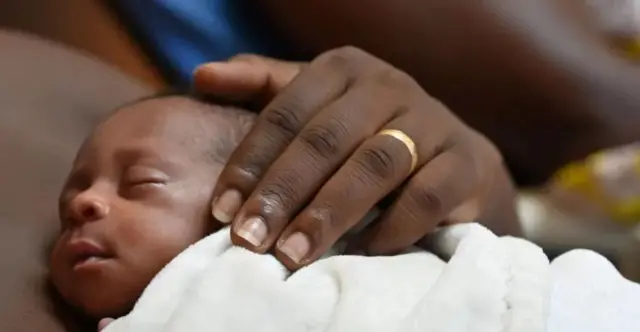 Image source, Issouf Sanogo/AFP
Image source, Issouf Sanogo/AFPZeinab Dabaa
BBC News
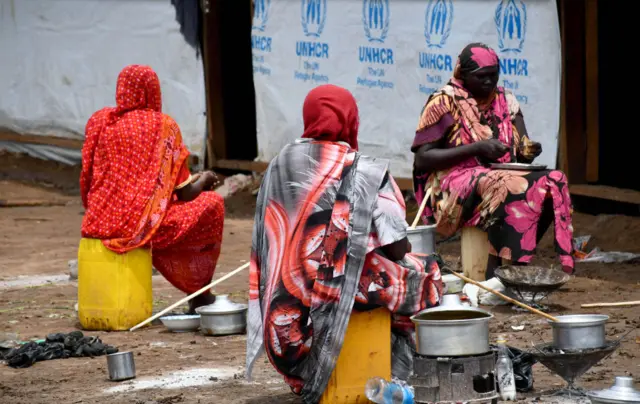 Image source, Getty Images
Image source, Getty ImagesThe UNHCR has set up camps for some of the refugees fleeing Sudan in South Sudan's capital, Juba
South Sudan was caught "unprepared" for the influx of refugees that would enter its borders after conflict broke out in neighbouring Sudan in April, South Sudanese Foreign Minister Deng Dau Deng told the BBC.
The "humanitarian demand is high" especially for food, healthcare and shelter, he said, describing the situation as challenging.
Mr Deng added that so far, around 150,000 people have fled Sudan into South Sudan, the majority of whom are returning nationals.
He also denied rumours that South Sudan had closed its borders to Sudanese refugees.
Read more about the Sudanese conflict:
Priya Sippy
BBC News
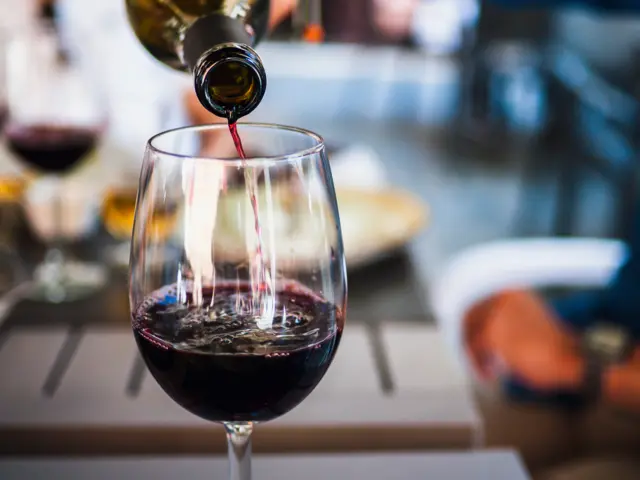 Image source, Getty Images
Image source, Getty ImagesDrinking too much alcohol is linked to health problems such as mental and behavioural disorders, among other diseases, the WHO warns
The Ugandan government has announced plans to increase the legal age for consuming alcohol from 18 to 21.
The World Health Statistics 2023 Report ranks Uganda among the leading countries for high rates of alcohol consumption.
According to the WHO report, it is estimated that Ugandans currently consume 12.2 litres of alcohol per person annually, which is significantly higher than the global average.
“Research has shown that if someone has not taken an addictive substance by 21, they are much less likely to use addictive substances later in life,” Dr Hafsa Lukwata, the Ministry of Health commissioner for mental health, alcohol and substance sbuse, told the BBC.
“There has been a public outcry over substance abuse in young people," Dr Lukwata added.
She said that parliament will discuss the age limit, among other measures, in the soon-to-be presented Alcohol Control Bill.

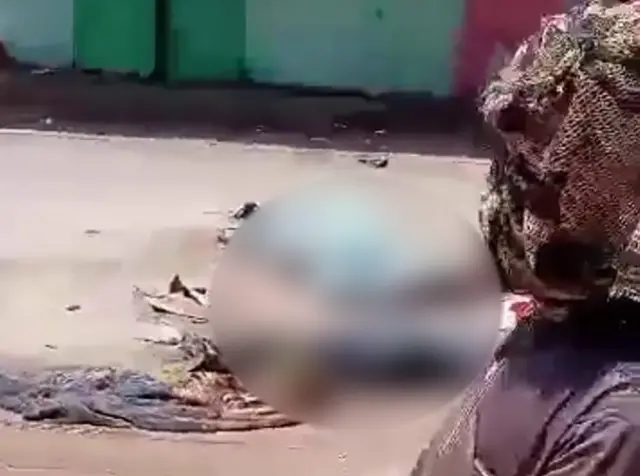
One video showed bodies lying in the middle of a street
The BBC has seen evidence supporting claims of bodies left lying out in the open after serious violence in the Darfur region of Sudan between the Rapid Support Forces (RSF) and the Sudanese army. In Darfur, some Arab militia groups have supported the RSF.
We have verified two videos from one location in the city of El Geneina posted on Twitter earlier this month showing bodies lying on a road.
We were able to match buildings and objects in the videos to satellite images of El Geneina.
In one video, there is a mention of the local branch of the Bank of Khartoum, which we were also able to locate.
It’s not possible to say either when the videos were filmed or who did the filming.
But one appeared on Twitter around the same time the West Darfur governor Khamis Abakar was killed on 14 June. In this video, the person filming makes derogatory comments about non-Arabs living there.
The Darfur Bar Association (DBA) said this week that corpses remain on the streets, inside homes and in various public places.
Much of the money was owed to China, which had been accused of holding up a deal.
Read MorePriya Sippy
BBC News
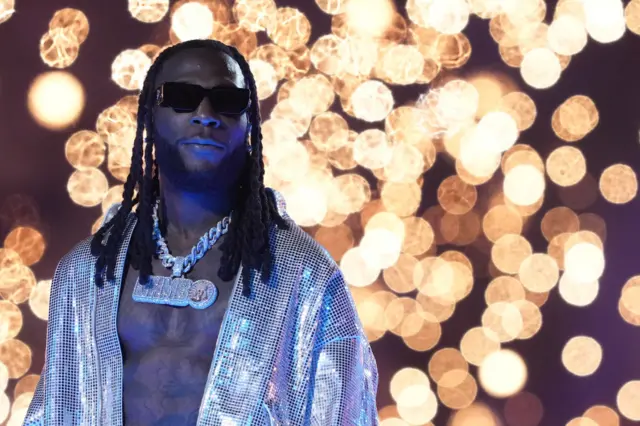 Image source, Getty Images
Image source, Getty ImagesBurna Boy (pictured) is one of the top Afrobeats stars
As the popularity of Afrobeats continues to grow worldwide, Spotify has launched a new platform that is dedicated to all the latest news and developments in the genre.
The site, Afrobeats: Journey of a Billion Streams,, external will feature interviews with leading experts, videos and the latest Spotify data and trends around Afrobeats listening.
Last year alone, Afrobeats had over 13 billion streams on Spotify.
"There is no doubt that Afrobeats as a genre is here to stay and will only continue to shatter more ceilings," says Jocelyne Muhutu-Remy, managing director for Spotify in sub-Saharan Africa.
"We created this site for both new and long-time fans of the genre who want to better understand how and where this explosive sound came to be."
Rema’s song Calm Down featuring Selena Gomez remains the top streamed Afrobeat song of all time, followed by CKay's Love Nwantiti (ah ah ah), while Germany and the Netherlands are named as the biggest emerging markets for Afrobeats.
The UN has urged Tunisian authorities to end a crackdown on the media and free speech.
It comes a few days after a prominent Tunisian journalist was arrested on charges of insulting President Kais Saied.
A judge ordered the detention of Zied el-Heni ahead of a trial in which he could be sentenced to five years in prison.
In a statement, UN High Commissioner for Human Rights Volker Türk described the situation as "troubling".
"The crackdown earlier this year against judges, politicians, labour leaders, businesspeople and civil society actors has now spread to target independent journalists, who are increasingly being harassed and stopped from doing their work," Mr Türk said.
"I urge Tunisia to change course," he added.
President Saied has previously defended his administration by saying he wants to save the north African nation from chaos.
However, critics have accused him of staging a coup after he suspended the National Assembly in 2021, passed a new constitution and moved to rule by decree.
Marco Oriunto
BBC Focus on Africa podcast
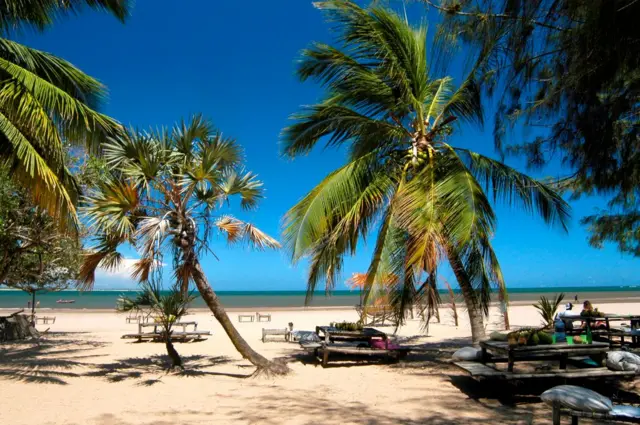 Image source, Getty Images
Image source, Getty ImagesOnce a quiet fishing village, Malindi has become a holiday destination popular with European tourists
Malindi, a Kenyan seaside town by the Indian Ocean known as "Little Italy", is where the late Silvio Berlusconi liked to go for a health boot camp.
The former Italian prime minister, whose death at the age of 86 was announced earlier this month, used to unwind at The Lion in the Sun, a billionaire retreat hotel.
Former manager of the hotel, Philip Chai, told the BBC Focus on Africa podcast that his bills were always covered by Flavio Briatore, an Italian businessman who owns the hotel.
With his team of security with him, it was not easy to get access and talk one-to-one with the Italian politician.
But Mr Chai remembers that he did speak to him every morning, in English, before he headed into the spa - as he says Berlusconi liked to stick to his health regime during his stay.
“He spent a lot of his time in the spa,” said Mr Chai, who retired from the Lion in the Sun last year.
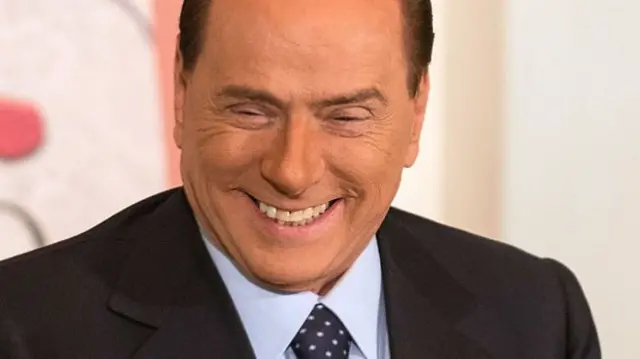 Image source, Getty Images
Image source, Getty ImagesSilvio Berlusconi survived many a scandal
Berlusconi did not tend to try local dishes, such as ugali, preferring pasta, and a lot of vegetables - as requested by the spa.
“He ate what was being produced from the kitchen - once it had been inspected by his team.
“He ate things like prawns in garlic butter on a bed of rice with lots of vegetables… part of the requirement from the spa, so he was able to detox - and so that by the time he gets back he’s prepared for that major operation - fighting for being a prime minister.”
Over a five decade career, Berlusconi always managed to bounce back from sex scandals and corruption cases - so perhaps Malindi was one of the keys to his success as the place where he could recharge.
You may be interested in:
Following his decision to retire, BBC Sport Africa looks back at the highs and lows of the Ghana legend's memorable career on and off the pitch.
Read More BBC Monitoring
BBC Monitoring
The world through its media
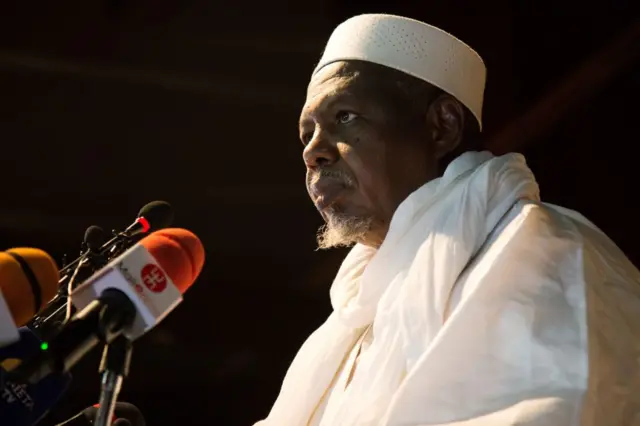 Image source, AFP
Image source, AFPMuslim cleric Mahmoud Dicko is a vocal critic of the ruling junta
Mali's military-led government on Thursday seized the diplomatic passport of influential and outspoken Muslim cleric Mahmoud Dicko, who is a vocal critic of the ruling junta.
Community-based station Radio Nostalgie reported that the authorities seized Mr Dicko's passport at an airport in the capital, Bamako, upon his return from neighbouring Mauritania.
Mr Dicko was issued with the passport by the government of the late President Ibrahim Boubacar Keïta.
“Less than a week after vehemently criticising the transitional government, Dicko is more than ever in the crosshairs of the authorities,” privately-owned channel Renouveau TV reported.
In May, Mr Dicko and several Islamic groups launched an "anti-secularism" movement to oppose plans to designate the country as a secular state as envisioned in a draft constitution.
Mr Dicko also played a leading role in the protest movement that led to Mr Keïta’s downfall in 2020.
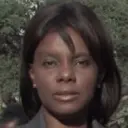 Shingai Nyoka
Shingai Nyoka
BBC News, Harare
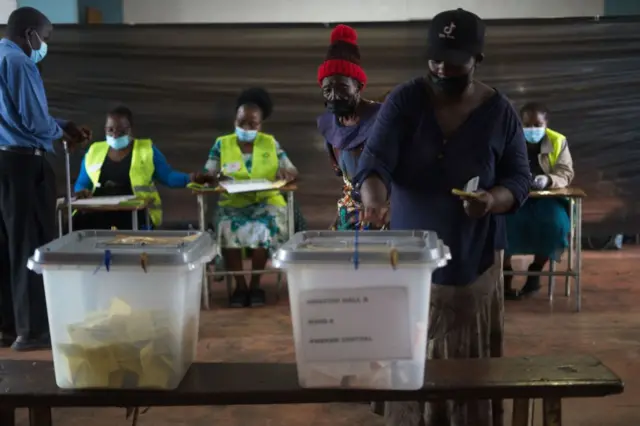 Image source, AFP
Image source, AFPZimbabwe will hold presidential, parliamentary and council elections on 23 August (file photo)
Zimbabwe’s electoral body has cleared 11 people to contest in presidential elections in August, after many politicians complained of exorbitant application fees.
The Zimbabwe electoral commission raised registration costs to $20,000, up from $1,000 in the previous elections. Fees for the MPs' positions were raised from $50 to $1,000.
Opposition parties said the fee had a negative effect on democracy as most people earn less than $300 a month.
Zimbabwe will hold presidential, parliamentary and council elections on 23 August.
The electoral commission worked late into the night to approve the 11 candidates.
They include the two front runners, President Emmerson Mnangagwa and his main rival Nelson Chamisa. An exiled former government minister will also run as an independent.
The number of candidates is half that of 2018, after many familiar faces opted out citing the exorbitant registration fee.
Zimbabwe is facing cash shortages, and an economic crisis that has eroded earnings - most people earn less than $300.
At least 10 hopefuls were rejected, and for the first time in years, no women candidates were cleared to contest.
They have four days to appeal against the electoral body’s decision.
Read more about Zimbabwe's elections here.
 BBC Monitoring
BBC Monitoring
The world through its media
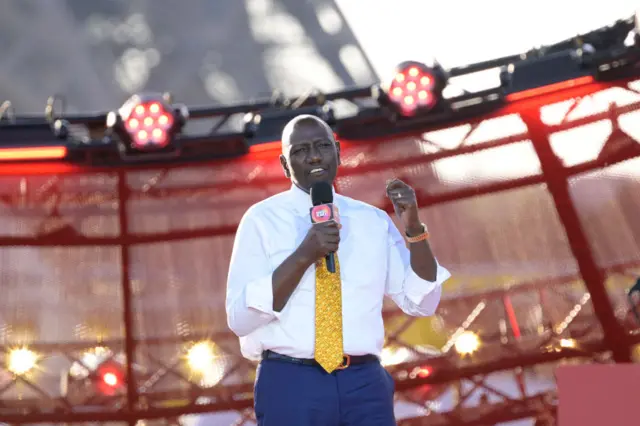 Image source, Getty Images
Image source, Getty ImagesWilliam Ruto has urged world leaders to support his call for the revision of global financial models
Kenya's President William Ruto has asked the World Bank and the International Monetary Fund (IMF) to reduce stringent measures on loans granted to African countries to ensure fair access of resources.
"Africa does not want anything for free. But we need a new financial model where power is not in the hands of the few," said Mr Ruto.
Mr Ruto, who spoke when he met with Franch President Emmanuel Macron, IMF chief Kristalina Georgieva, and World Bank Group president Ajay Banga in Paris on Thursday, urged world leaders attending the New Global Financial Pact Summit to support his call.
Mr Ruto's administration received $600m (£470m) from the IMF in the autumn and winter of 2022.
It also got $993m from the World Bank in May to help the government fund the budget.
Most African countries struggle with foreign debts due to ballooning inflation and increased borrowing.
Jessica McCallin
BBC World Service Newsroom
 Image source, Getty Images
Image source, Getty ImagesLibya banned manufacturing of virtual currency in 2021 (stock photo)
The authorities in Libya have detained 50 Chinese nationals following a raid on an illegal cryptocurrency operation.
Photos published by the Tripoli prosecutor show large, windowless rooms crammed with hardware and computers in the city of Zliten.
On Wednesday, 10 other Chinese people were taken into custody for crypto-mining in the port city of Misrata.
Libya banned the manufacturing of virtual currency in 2021.
It's thought miners are attracted to the country in part because of low energy costs.
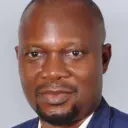 Chris Ewokor
Chris Ewokor
BBC News, Abuja
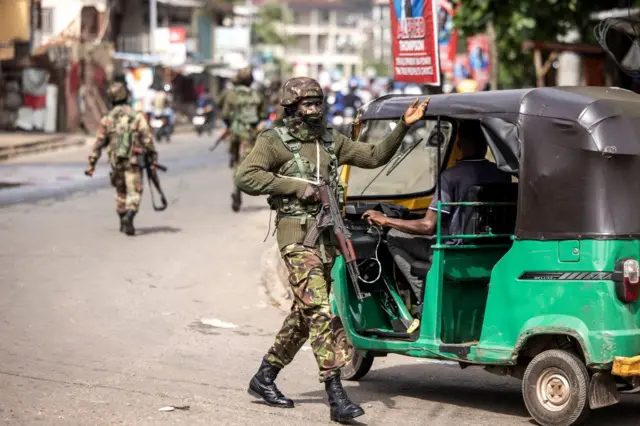 Image source, AFP
Image source, AFPElection observers have called on security forces to remain apolitical
Election observers in Sierra Leone have voiced concern over incidents of violence and intimidation ahead of Saturday's presidential poll.
Observers from the African Union and the West African regional bloc, Ecowas, issed a joint statement urging political parties and their supporters to abide by the rule of law.
They also called on the security forces to remain apolitical.
On Wednesday, supporters of the opposition All People's Congress (APC) clashed with the security forces near the party's headquarters in the capital, Freetown.
One person was killed.
The APC has called for demonstrations over what it calls discrepancies in the electoral process.
President Julius Maada Bio is seeking re-election in the vote, which will be the fifth presidential poll since the end of the civil war in 2002.
Sierra Leone has seen waves of violence in recent months. Last year there were deadly anti-government protests over rising cost of living and economic hardship.